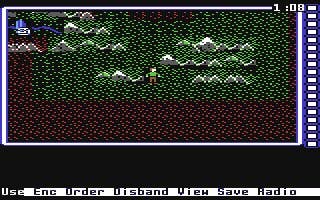Wasteland
Mega apocalypse.
Before Fallout came Wasteland - Interplay's masterful first stab at creating a post-apocalyptic role playing game, and easily one of the most ambitious and forward-looking games ever created for an 8-bit system.
Unsurprisingly, it scooped several Game of the Year awards in 1988, and even now stands out as an important landmark in the evolution of the genre, having once been voted the 9th best game of all-time. Hell, co-designer Brain Fargo has even bought the rights back to it, and intends to bring the brand back from its EA-doom. Woo!
Presented in typically lavish EA packaging, this two disk game played up to the still-relevant late '80s obsession with Cold War tensions between the US and the Soviet Union. In the mid 21st Century, nuclear war has turned the significant parts of world into a radioactive wasteland, where mutated beasts and aggressive technology fights for what's left.
As was standard in previous Interplay games like The Bard's Tale, you created a party of four Desert Rangers, and carefully distributed skill points as you saw fit. From there, the vast, intricate, fascinating game world was open to your grizzled band to explore; encountering all manner of mutant filth and curious characters - some of whom you could actually recruit into (or fire from) your party, bolstering your numbers up to seven in total. Unlike other RPGs, these mercenary recruits could sometimes disobey orders. The cheek!

The core gameplay stuck to the simple RPG rules of being able to move your party around a rudimentary top-down map, with combat encounters resulting in a larger, slightly animated picture of your assailants. As you'd expect, the name of the game was about acquiring experience and cash, upgrading your party, and eventually tooling yourself up to take on the really bad guys.
Rich with a unique atmosphere of devastation and desperation, Wasteland offered a fresh take on RPGs at a time when mythical ancient fantasy was seemingly the extent of most developers' imaginations. It might look pretty basic now (for some reason, the DOS version was much uglier than the superior C64 edition), but it's a testament to the legacy of the game that so many of its ideas can be found in today's blockbusters.



